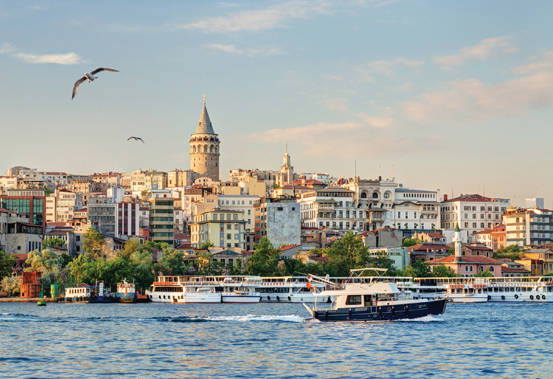Professor Muammer Ozer is Director of the Doctor of Business Administration programme and Professor of Management. Professor Ozer has recently been honoured with the 2015 City University of Hong Kong Teaching Excellence Award. He has been sharing his teaching philosophy and approach on many other platforms. In this personal reminiscence Professor Ozer looks back over his early life, the influences that shaped his education and choice of career, and how he became an 'accidental' professor of management.
My early life was shaped by these sorts of cultural sayings. Education was very important to my family. When my parents were young it was the time of the Second World War. There was a shortage of food, and lots of hardships and challenges. As a young man my father had no formal education, and finally graduated from secondary school as a mature student in his 40s. My mother also had no formal training, but she raised five children and was able to educate herself by helping us with our homework.
Turkey is a huge country. My parents moved from the northeast close to the Black Sea region bordering Georgia. The family were originally farmers coming from an isolated, mountainous and necessarily self sufficient region. I remember them saying that in the winters they would be cut off by snow for up to nine months. Eventually my father moved to the south, working as a tailor and trading in clothes. And in the late 1960s he moved to the big city – Istanbul.
One of the world's oldest engineering schools
I went to a traditional engineering school, Istanbul Technical University, which dates from the 18th century. It was a highly structured and analytical school, and very disciplined. It had been founded as part of the Ottoman Empire, and had a long tradition in civil and mechanical engineering. This Empire was massive – covering parts of the present day Balkans, Hungary, Rumania, and other European countries, and at one time stretching almost all the way north west to Vienna in Austria and south east into Arabia. To cover these long distances, roads, bridges, irrigation works and later railways were necessary. These were the things that civil engineers worked on.
The university's foundation classes were in maths, geometry, introduction to physics, engineering, and then we specialised. It was very traditional, a far cry from today's interactive classes. There were hundreds of students in the foundation classes and I don't remember saying even a word in those classes. They took place in large round lecture theatres, with very steep seating and good acoustics. The professor would enter, turn his back to us, and start writing on a blackboard.
Learning English on the streets of Istanbul
In my free time I used to go to the Blue Mosque area of Istanbul. There I would volunteer my services as a guide, and in return learned English from the tourists. As a young undergraduate student, I, at that time, was not really interested in those old stone artifacts. But for the tourists they meant something, so I learned some history from them also! Sometimes, we would go on cruises up and down the Bosphorus, the narrow stretch of water separating Europe from Asia. There were fish restaurants up by the Black Sea. Some of the tourists became pen pals – this was well before email arrived.
Istanbul has always been a very progressive city. Every time I came back from the US, there were new tunnels, bridges, highways, infrastructure, a bit like China during the last few decades. It's still going on. Now three new bridges have been built over the Bosphorus as well as a tunnel for the railway, and another tunnel for traffic.
A trip into outer space: The United States
I went to the US in the mid-1980s, a first for our extended family and friends as nobody had been abroad. I went on a scholarship from a Turkish agency to learn English formally. I studied English at Michigan State University – predominantly an agricultural college. I thought everywhere in the US would be like New York, very crowded, but East Lansing was basically a College town, and very small. It didn't feel like the US to me. For my family my going to the US was like sending someone into outer space! After that I went to Azusa, east of Los Angeles, a very hot and dry inland area skirted by desert mountains. Finally I went to one of the few business schools that would admit students in the winter – St Louis University – and graduated with an MBA after eighteen months.
Academic or business career?
I was interested in innovation and technology management, and gained an engineering scholarship under one of the most famous professors in innovation technology management. But like other young graduates I couldn't decide if I wanted to pursue an academic or a business career. Back home, a Taiwanese company offered me a job as country and regional manager for Turkey and the Middle East. But then the Chairman gave me some very fatherly advice:
"Look," he said. "You can always come back to work with us, but if you decline this PhD offer you may not have this kind of offer in the future. Maybe you should go and study for a few years."
The accidental Professor of Management
I was in engineering school for just a few months. Then my supervisor was hired to be the Director of a newly-created research centre at the University of Alabama – and unfortunately I could not go with him because they did not have a PhD programme. All the other remaining professors in the engineering school were researching on traditional engineering or manufacturing topics rather than innovation and technology management, which I was dying to study. As a result, I switched to the business school, a completely unexpected turn of events. I did my PhD in Business Administration, at the Joseph M. Katz Graduate School of Business, at the University of Pittsburgh, Pennsylvania. So I am really an accidental professor of management!
The Business School was excited to get someone with an engineering background on board. You have to be independent as a PhD student and I was a really independent student, able to solve problems. It was a big adjustment getting used to interaction, group work. But in every research study there was at least a regression model. This is where I excelled. Friends and sometimes even professors would come to me and I would try and solve their problems.
Innovation – on the front cover
In the 1990s the US was booming. I quickly found out that there was no problem in legitimizing my study on innovation. It was a very visible topic, a cover page story on an almost weekly basis in Time Magazine, Business Week, or Forbes. I did not have to explain to people that innovation was a worthwhile topic to study. Innovation was, and is, the lifeblood of America.
And my timing was good. I did a dissertation in the early nineties on online business. So, my research, at that time, was characterized as pioneering work. I was interested in preproduction market assessment of new product ideas. Even today more than 50% of new products fail. So what is viable? How do we assess new product ideas? I tested my model in the context of internet business. I set up four internet portals in music, sports, shopping and business information. Success was measured in hits or time spent in the portals. I required a user ID and password so it was possible to trace users. I could compare stated intentions against actual behaviour. Then I became a teaching assistant, a teaching instructor – and have really never looked back.
I will be willing to be your slave if you will teach me just one letter
Throughout their lives my family have always been supportive of me. A couple of years ago I came to understand the depth of this support. My father was seriously ill but he asked my family members not to inform me. To the last he was thinking of me and he did not want to disturb my research. Unfortunately he passed away, and I was late for his funeral. But that was another sign – the last sign – as to how serious he was about education and supporting my work.
My father grew up with concepts such as: "I will be willing to be your slave if you will teach me just one letter," and "Accumulate knowledge rather than wealth." He also believed that "A candle loses nothing by lighting another candle." So, he was very happy that I was accumulating knowledge and sharing it.
For him, respect for education was something that never left him. I seek to emulate his example.
How life influences teaching practice
When I look back on my life so far, there are a couple of influences I can see that have clearly affected my approach to teaching. Firstly, I was brought up in a very conservative environment and received a traditional engineering education. The teacher was the purveyor of knowledge. The students respectfully listened and were essentially passive receivers of information. This model may be suitable for more hierarchical societies, but clearly has been supplanted in favour of interactive models in an environment like Hong Kong. In particular, with postgraduate students who are practicing managers, it is often possible to leverage their expertise to create interesting classroom interactions, and to work in learning partnerships. Secondly, my research work around innovation has given me a lifelong interest in this area – one that extends to teaching. So, the introduction of the Discovery Enriched Curriculum at CityU has very much chimed in with my own approach, and I take every opportunity to not only enrich my teaching content but also to incorporate innovative teaching techniques in and around the classroom.


